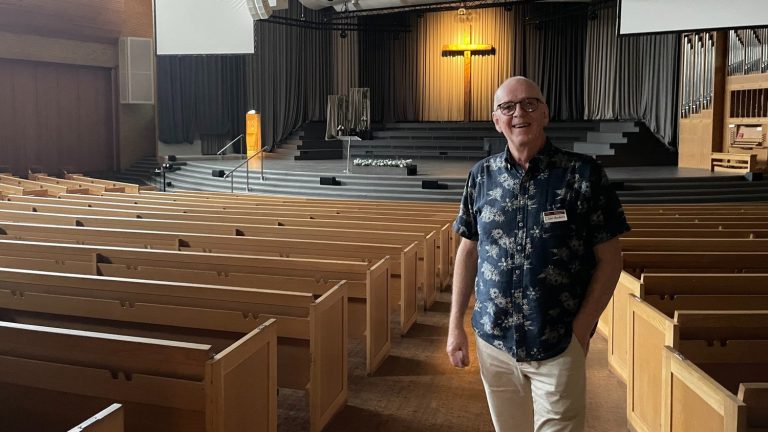
[ad_1]

Outside these “Bible Buttons,” Dagen reports that Muslim communities are growing quickly while traditional free churches are shrinking such as the Equmenia Church, which lost 3,930 members since 2017 for a total membership of 58,569 in 2021. The Evangelical Free Church decreased slightly by 1,654 members since 2017 for a 2021 total of 27,582 members. The Pentecostal movement churches only lost 546 members since 2017, with 86,807 total members remaining in 2021. The churches growing most rapidly in Sweden are actually the Catholic Church, followed by the Orthodox Christian Church.
“The understanding of religion is a little bit going down,” said Pettersson, the retired Pentecostal minister from Stockholm who now volunteers at Pingst Jönköping. “The younger generations don’t understand it so much.” He sees more charismatic efforts such as Hillsong Church reaching younger people. “We are baptizing many people. But Sweden has similar trends to the United States,” Pettersson said. “It’s a struggle.”
The United Islamic Societies nearly doubled from less than 15,000 members in 2017 to 30,000 members in 2021 and has a Sunni mosque in Stockholm’s Södermalm area. Another Sunni Muslim community called the Islamic Cultural Union in Sweden grew from 10,755 members in 2017 to 18,557 members in 2021 according to Dagen research. The Islamic Shia Communities has grown to 36,774 members in 2021.
Meanwhile, the Catholic Church gained 7,285 members since 2017, with 126,286 total members in Sweden. The Macedonian Orthodox, Syriac Orthodox and Romanian Orthodox churches all grew to total 32,455 members. By contrast, the Church of Sweden had roughly 5.6 million members in 2021 but lost 365,301 members since 2017.
Free churches and nationalism?
I was curious how the free churches align politically and if they compare to the U.S., where Protestant evangelicals tend to vote Republican, with a large majority voting for Donald Trump in 2016 and 2020. Do Swedish evangelicals also lean right politically on issues such as abortion and immigration? Would many of them characterize themselves as “Christian nationalists?”
Alestig noted that Sweden has a range of political parties, which creates a richer mosaic rather than a political binary. At times, free churches aligned more with the Social Democratic Party, particularly on issues such as trade unions, supporting the poor, caring for the elderly and helping single mothers.
As Social Democrats became more hostile to religion and believers cared more about social issues, some new parties emerged, such as Folkpartiet (Liberals) and Kristdemokraterna (Christian Democrats). Alestig said her newspaper has reported data that most members of the Church of Sweden vote left for the Social Democrats, Vansterpartiet or the Green Party. She believes most free church attendees vote to the right, meaning Christian Democrats, Liberals or Moderaterna.
Alestig thinks few churchgoers in Sweden would vote for newer populist parties, such as Sverigedemocraterna, which take on Christian nationalist rhetoric and imagery. But she sees Sverigedemocraterna trying to recruit evangelical voters and perhaps winning a few of them on culture war issues such as abortion, stronger national defense and limited immigration.
“I don’t think the term ‘Christian nationalist’ would mean very much to people in Sweden,” Alestig said. “To be Christian is not linked to being a nationalist. In this regard Sweden differs from the U.S.”
Rudenstrand said that linking conversations and sermons that mention the golden cross on the Swedish flag, the nation’s Christian heritage and a sense of a “calling to the nations” to the idea of “Christian nationalism” is “not near some of the extreme forms in the U.S.”
“Most evangelical Christians in Sweden are pro-migrants even if the preferred level of immigration varies among Christians in Sweden,” Rudenstrand said. “This is due to the fact that issues such as segregation, crime, and other related issues are at the forefront of the political debate today. Some Christians to the left would describe the political movement today in nationalistic terms, and there are recurring debates about whether the government’s policies are Christian or not.”
Rudenstrand said that many bishops in the Lutheran Church of Sweden lean more left and criticize the government policies on migration for being “too conservative / nationalistic and not Christian enough based on Leviticus chapter 19.” So he sees some Church of Sweden leaders view Sweden as having a divine calling but from the “other side of the political spectrum.”
Finding solutions in the Greatest Commandment
Rudenstrand said some of the cultural elite in Sweden speak and write about the importance of faith and the church for them, but he still sees secularism as the norm in education, politics and culture in Sweden. He thinks Protestant evangelicals are still often viewed with suspicion for their beliefs in the reliability of the Bible, the bodily resurrection of Jesus and questions of truth.
“Many of us evangelicals outside the U.S. are mostly a minority of the population compared to our brothers and sisters in the U.S. and thus lack any real cultural and political influence,” Rudenstrand said. “Because of this we have learned and continue to learn how to live creatively for the gospel in a very secularized country, something the U.S. is moving toward.”
[ad_2]
Source link